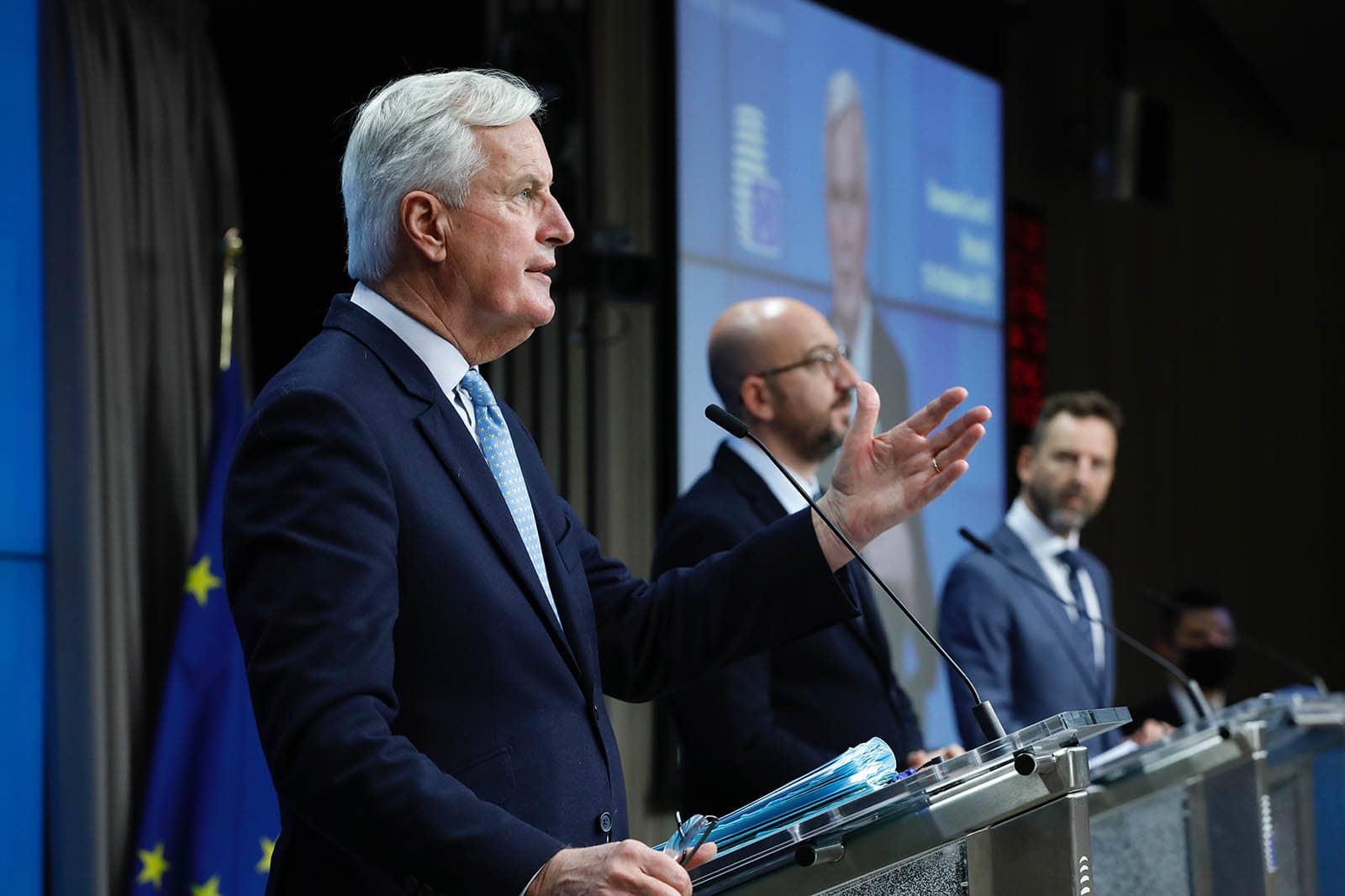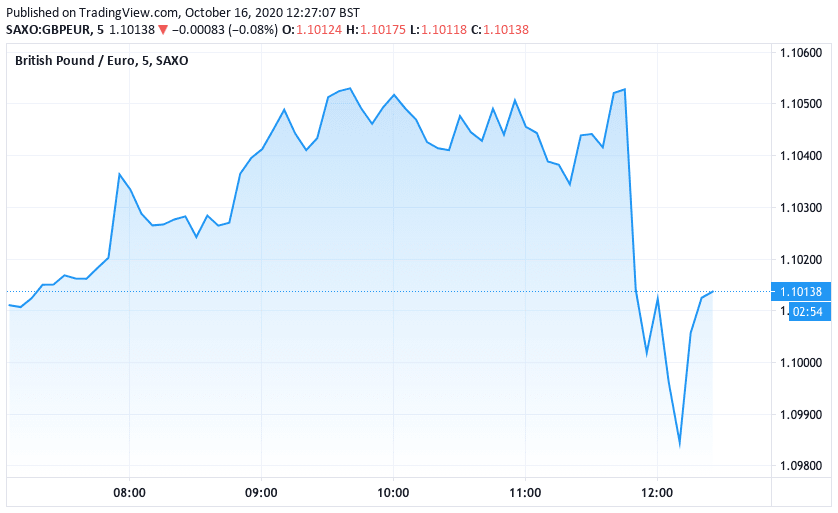Pound Sterling Volatile after Johnson says Australia-style Trade Deal Likely, says UK Stepping Back from Talks
- GBP volatile ahead of the weekend
- Johnson says needs a fundamental shift from the EU on trade talks
- France maintains uncompromising stance on fisheries
- Markets prepare for weeks more of negotiations and squabbles

Above: Michel Barnier, EU Chief Negotiator and Charles Michel, European Council President, address the media on the matter of trade negotiations following the EU Council Summit. Copyright: European Union.
- Market rates: GBP/EUR: 1.1006, GBP/USD: 1.2909
- Bank transfer rates: 1.0790, 1.2648
- Specialist transfer rates: 1.0905, 1.2793
- Learn more about market beating exchange rates, here
- Lock in today's rate for use at a future point in coming months, here
The British Pound experienced turbulence ahead of the weekend after UK Prime Minister Boris Johnson responded to the ongoing impasse with the EU in efforts to secure a free trade deal.
In a televised statement Johnson said the UK is now preparing for a relationship with the EU, "more like Australia's, based on simple principles of global free trade."
An Australia-style deal is short-hand for a 'no deal' outcome to trade negotiations and would be seen as a worst-case outcome for Sterling exchange rates.
Johnson said the EU has "refused to negotiate seriously" in ongoing trade negotiations, but the UK was still committed to finding a solution.
The Pound fell against the majority of its peers following Johnson's remarks but soon found its feet as there are, ultimately, no surprises out of either the EU conference on Thursday and Johnson's remarks on Friday.
"Sentiment will remain fragile with risk of pullbacks on negative headlines. Lots of noise for the day traders to latch on to but no trend emerging," says Neil Wilson, Chief Market Analyst at Markets.com.
Above: GBP/EUR dips following Johnson's statement. If you would like to lock in current rates ahead of further turbulence, please learn more here
But, the EU was quick to respond to Johnson and expressed desire to keep talks moving.
"Our negotiation team will go to London next week to intensify these negotiations," said EU Commission President Ursula von der Leyen in response to Johnson's message.
In addition to von der Leyen, newswires are reporting:
- Dutch PM Rutte says that he believes there is scope for talks next week between the EU and UK to take place in the spirit of compromise
- French President Macron says he wants clear rules for French fishermen on Brexit, says fishing is not the issue why Brexit talks are failing
- German Chancellor Merkel says we also have to show a willingness to compromise for a Brexit deal
- EU Council President Michel says the body is ready to continue with talks
That the EU and UK are still willing to negotiate should ultimately limit downside in Sterling and keeps alive a base-case assumption held by political and financial analysts alike that a Brexit trade deal will likely be struck towards the middle or end of November.
"Both sides are working towards a deal and continue to do so. Both sides want a trade deal to be able to sell to voters and ‘move on’. Time is tight but a thin or skinny trade deal ought to be accomplished. An informal meeting of heads of state in Berlin scheduled for Nov 16th may be the crunch point," says Wilson.
Fears were heightened that Johnson might prompt a political crisis with the EU in order to try and secure a deal after the UK's Chief Brexit negotiator expressed disappointment with the statement issued by European leaders following this week's European Council summit, which warned that unless the UK compromised there would be no trade deal to sign before year-end.
"Disappointed by the European Council conclusions on UK/EU negotiations. Surprised EU is no longer committed to working "intensively" to reach a future partnership as agreed with Ursula von der Leyen," said Frost, following the release of a statement concerning the Brexit trade negotiations by EU leaders.
EU leaders said in a statement "the European Council invites the Union's chief negotiator to continue negotiations in the coming weeks."
Secure a retail exchange rate that is between 3-5% stronger than offered by leading banks, learn more.
A draft statement pencilled prior to the EU Council summit was leaked to the press on Wednesday and it said read, "the European Council invites the Union's chief negotiator to intensify negotiations in the coming weeks."
The switch from 'intensify' to 'continue' is significant in that it suggests the EU believes not enough concessions have been forthcoming from the UK to allow negotiations to enter the so-called 'tunnel' phase; an intense period of talks held behind closed doors by small teams from both sides as the final details of a deal are agreed.
The UK was looking for the EU's statement to signal a move to this phase as some concessions had been made by EU leaders, particularly on the maximalist stance of France, Ireland and Spain regarding access to UK fishing waters.
Instead the EU statement called "on the UK to make the necessary moves to make an agreement possible."
"Also surprised by suggestion that to get an agreement all future moves must come from UK. It's an unusual approach to conducting a negotiation," said Frost in response.
EU Chief Negotiator Michel Barnier responded to Frost in a statement following the conclusion of the summit: "we remain determined to reach a fair deal. We will do everything we can - but not at any price. Our team will continue intensive discussions over the coming weeks. We remain calm, united, determined."
Note that word "intensive" in the statement, a decision political commentators are saying is an attempt to appease Frost.
"The coming days could be decisive, and traders are braced for amplified GBP volatility," says George Vessey, Currency Strategist at Western Union.
The Pound-to-Dollar exchange rate dipped briefly on the news but is stuck around 1.29 as markets don't appear to be overly concerned by Friday's developments. For GBP/USD we are inclined to believe broader moves in the Dollar in reaction to global market sentiment are more important at this stage.
Indeed it is the Pound-to-Euro exchange rate that remains the best steer of market sentiment on Brexit trade negotiations, Mark McCormick, Global Head of FX Strategy at TD Securities says a "low r-squared in GBP means that we can trade EUR/GBP as a Brexit proxy in the weeks ahead."
A look at GBP/EUR ahead of the weekend shows it to be trading just above 1.10, a decline from this week's highs at 1.11 in sympathy with the disappointing outcome to the EU Council summit. Despite the decline, we note in an article here that Sterling is still engaged in an uptrend against the Euro and GBP/EUR could be on course to break above 1.11.
"Brexit tensions continue to simmer, keeping markets on edge, but we think a landing zone will be found eventually," says McCormick.
TD Securities tell clients they remain focused on the upside potential in Sterling against the Euro, for now.
The prospect of a trade deal being agreed in the near-term looks to be limited given the strong resistance shown by EU states with significant interests in maintaining current access to UK fishing water.
"On no account will our fishermen be sacrificed for Brexit. We didn’t choose Brexit, the British people did. So preserving our fishermen’s access to the UK’s waters allows a good compromise," Macron told reports on his arrival at the two-day European Council summit.
Fishing looks set to be the final hurdle for negotiators to overcome before a deal is signed, and the decline by Sterling against the Euro, Dollar and other major currencies is testament to anxieties that a deal could yet fail to materialise before the transition period ends on December 31.
"The second issue we need to have fair conditions between the UK and EU to assure us that we have a level playing field on state aid and regulations, especially socially and environmentally. Brexit should not create social or environmental 'dumping' on our border," said Macron, adding, "I want to be clear: this deal will not be made at any price. If these conditions are not met, it’s possible there won’t be a deal. We are ready for that. France is ready for that. We are in the process of finalising... we are ready for a no-deal."
Ambrose Evans-Pritchard, the International Business Editor of The Daily Telegraph, says Macron might have "walked into a Brexit trap. Even those most sympathetic to the EU can see that his maximalist claims on sovereign British waters amount to indefensible overreach and 'cakeism'".
'Cakeism' refers to the EU's often-used line over recent years that the UK cannot 'have its cake and eat it', a reference to the UK's desire to exit the EU, take back full control of its laws but still enjoy access to the EU's single market.
In a reversal of cake analogies, it appears the EU is willing to restrict access to their single market but keep UK fisheries in that single market.
"While France, in particular, is pushing hard to maintain the current EU quota system for fish, ultimately if there’s no deal then France would lose access entirely to UK fishing waters," says Daniel Vernazza, Chief International Economist at UniCredit Bank in London.
Coming weeks could well mean France is forced into a compromise by EU peers, particularly given for the majority of EU states fishing waters are of no consequence.
Evans-Pritchard notes the coverage in the German press over recent days "has been strikingly neutral or even friendly to the British point of view".
He cites Germany's Handelsblatt newspaper which asks readers how Macron can expect to perpetuate a regime in which French trawlers are entitled to 84% of the catch off Cornwall while Cornish fishermen are left with just 9%. "It marvelled at a relationship where European boats can come to within six nautical miles of the British coast while British boats must abide by the EU’s 12-mile rule," said Evans-Pritchard.
Ireland is another country that has expressed an interest in keeping access to UK fishing waters unchanged and the Irish Taoiseach Micheal Martin said on arrival at the EU Council, "we are concerned in terms of fisheries that our coastal communities are protected. Fisheries in key coastal communities represent the most significant industry in some areas in Donegal, in Cork and the south east, in Wexford, right across the seaboard."
However, Martin was less combative than his French counterpart, adding "there has been a degree of engagement between both sets of negotiators in the last while. In my view, with good political will on both sides, an agreement could be reached".
"While significant differences remain between the two sides, notably in the area of fishing rights, these differences are surmountable and both sides want a deal. Mr Johnson will almost surely agree to intensify trade talks in the coming weeks (what is referred to as entering “the tunnel” in EU jargon). In our view, a deal is now very likely," saysVernazza.
"While time is running short, there are at least a few more weeks to reach a deal and still leave enough time for the European parliament and UK parliament to ratify it before year-end. In reality, the negotiating teams now see the deadline as mid-November for a deal," he adds Vernazza.

